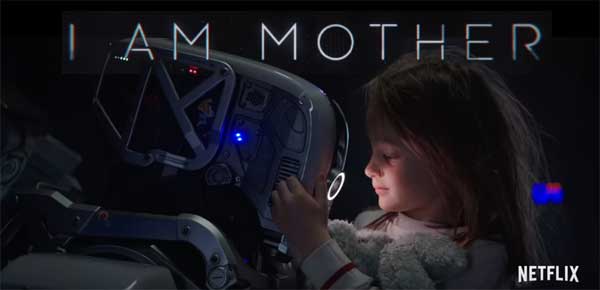
So Netflix was threatening to boycott the State of Georgia for its pro-life laws. Netflix is worried that Georgia will abort abortion. Because of this boycott threat, many pro-lifers are boycotting Netflix.
But Netflix is a hypocrite. It’s not really serious about abortion rights. Because if it were, it wouldn’t be streaming pro-life movies like I Am Mother. That’s right, Netflix actually streams a very pro-life, very anti-abortion movie. If Netflix doesn’t realize its contradictory stance, then it’s either simply hypocritical, or incredibly ignorant of its own content, or it’s secretly anti-abortion. I’m not sure what they are, but here are the pro-life signs from their recent critically acclaimed hit film itself:
—
—
—
—SPOILER ALERT—
—
—
—
- The film presents a feminine-voiced robot as a mechanical mother tasked with raising a baby girl. In fact, every mother figure in this film is female/feminine. In our LGBTQRSTUV+ conscious culture, why is the mother presented as womanly and feminine? Why do advanced, super artificial-intelligence robots of the future use old-fashioned traditional family roles in its attempt to raise the perfect human? Hint: because that’s how humans are meant to be best nurtured.
- There’s no mistake that motherhood is the theme of the film (the title?). But notice the plot twist: Mother-Bot has been long terminating human girls when they failed to qualify for continued existence. Mother-Bot administers tests on her daughters, and only raises the current protagonist because she has been passing. When we find that other girls had been gestated, born, raised, tested, failed, and then incinerated, we sense the film wants us to feel horrified. The fact that we don’t know how many girls have been burned to bones alludes even more to the fact that we may perhaps never know how many girls have been aborted in our world (in China alone, its missing an estimated 30-50 million girls. Talk about an actual war-on-women).
- But back to the film: so what if Mother-Bot terminated some girls during gestation? So what if Mother-Bot discovered a mutation, or a disease, or some other condition the unborn baby had, and then deemed her unqualified for the perfect life (whatever perfect even means)? What difference is there between terminating the girl then or terminating later? The motive is the same: the girl is not good enough.
- Here we see a commentary on the rampant objectification of girls and women in our culture. If she isn’t beautiful enough, hot enough, smart enough, small enough, skinny enough, et cetera enough, then she’s not worth it. If she doesn’t make me happy enough, proud enough, successful enough, then she’s something I must destroy. I decide if her life is worth the work I need to put in. –Mother-Bot

- But why does the film try to make us sense this mentality is horrific? If abortion is a woman’s right (as Netflix claims), then why is Mother-Bot not just an everyday hero doing what every mother should be free to do? Sure, you can say it’s because the baby isn’t actually inside Mother-Bot, but Mother-Bot even says in the film that she is more than just one robot, she is all of them, and the entire gestation/nursery facility, by extension. She runs everything, so actually Daughter is very much inside Mother-Bot, using her resources, time, energy, and space. And that relates very much to the argument for abortion-after-birth that is getting popular among many politicians of a certain political party: John Rogers (AL), Governor Northam (VA), Del. Tran (VA). After all, born babies keep using their mother’s resources, time, energy, and space… for years and decades.
- So point made: real motherhood is not about killing one’s children. We see this argued for by Daughter when she is upset about her culled siblings. If termination wasn’t bad, why all the outrage and fear from Daughter? Remember, Daughter is human: she is the protagonist who represents us in the film, as fellow humans who are pro-life/dignity/children/parenthood. Mother is the cold, mechanical, utilitarian, false-motherhood antagonist who is pro-choice/abortion. The choice is easy: be like Daughter!
- If that’s not enough signs of the film’s pro-life message, consider how the myriad fetuses are addressed: they’re called brothers and sisters. Including the unborn embryos! Their not called “clumps of cells”, or “potential people”, or merely “products of conception”. They are already family members.

- Additionally, quite a few Catholic symbols appeared both prominently and subtly in I Am Mother. Obviously, the rosary (as our Blessed Mother’s prayer), and the Marian icons (in the shipping container where the woman lived), but also that Daughter becomes the mother-figure for her newborn brother. Daughter, in a sense, is the virgin mother of the baby boy. For any astute Catholic, that’s an obvious reference to the only real-life Virgin Mother. Sadly, where the film is going with all this religious motherhood imagery is still lost on me, so if you have any insights, I’d be glad to hear it.
- On a related note, there’s also the issue of manufacturing children and growing them in gestation machines (as opposed to to conceiving children and carrying them in their mothers’ wombs). I’ve been mulling on writing something about this topic for a while, so this is a sign for me to get it out. But before it gets written, please see #3-4 above for arguments closely relevant, and also my philosophy thesis discussing the humanity and absurd predicament of frozen embryonic children.
So there we have it. Signs strongly suggesting that Netflix is flip-floppy about its abortion advocacy. Sure, boycott a pro-life state, but don’t boycott a pro-life movie streaming from your own collection? Come on. Just come out and say it: Netflix is secretly anti-abortion (or at least conflicted).
